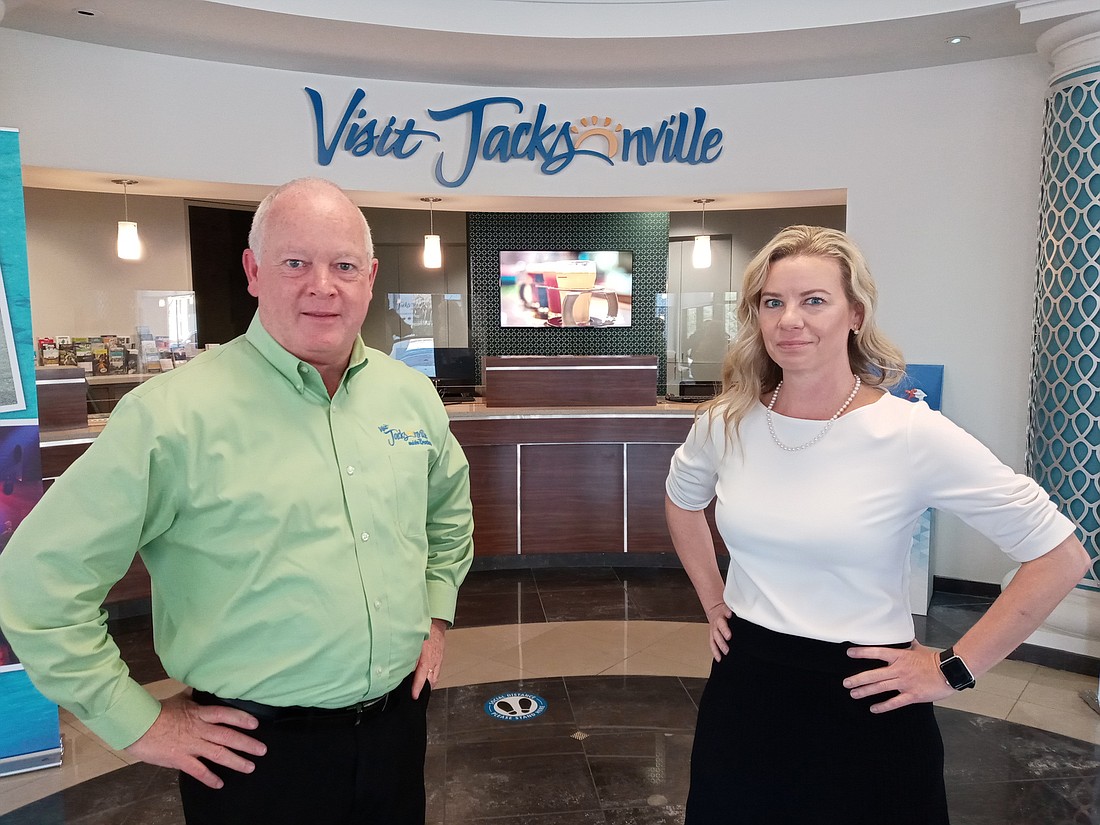
If Jacksonville’s hospitality industry was a person, the coronavirus would have put the patient in intensive care on life support just days after the pandemic began in March 2020.
According to data provided by Visit Jacksonville, the convention and visitors bureau for Jacksonville and the Beaches, hotel occupancy dropped from nearly 80% of rooms booked in February 2020 to barely more than 30% in April, the first full month of the pandemic shutdown.
When the bottom fell out of demand for hotel rooms, the average daily rate for the 18,717 hotel rooms at 164 properties in Duval County also suffered, declining from $100.94 in February to $65.05 in April.
That combination of factors made hotel revenue drop from $39.7 million in February 2020 to $10.2 million in April 2020.
The market began its slow, but steady, recovery in May.
In the week that ended March 27, the most recently reported, occupancy was 80.7%, growth of 137.5% over the same week in March 2020.
The average daily rate was $91.45, which was 30.8% better than the same week in 2020.
“Compared to other destinations in Florida, we’re happy,” said Michael Corrigan, Visit Jacksonville president and CEO.
In January, Visit Jacksonville analyzed hotel statistics from 20 comparable tourism markets in the U.S. and Florida.
Jacksonville’s occupancy 10 months into the pandemic was 61.8%, which was 9 percentage points behind January 2020. In Florida, it was behind only Key West (65.2%) and ahead of the other tourism destinations in the study.
The lowest occupancy in the state was in Orlando at 35.4%. The theme park-based hotel market was 41.5 percentage points below 2020.
Corrigan said with leisure travel the first segment to rebound, tourists are looking for destinations that aren’t perceived as crowded.
Visit Jacksonville shifted its marketing plan to focus on attracting tourists from cities within a seven-hour drive of Northeast Florida
“If you’re in Florida, you probably want to go somewhere in Florida. People in Miami, Orlando and Tampa might not have been to Jacksonville. If you’re in Georgia, you’ll avoid areas that you think of having lines and bumper-to-bumper traffic,” Corrigan said.
“Everything that Jacksonville is ended up being an asset in the recovery.”
With lower hotel occupancy and room rates come decreased revenue from Duval County’s 6% hospitality tax.
Collections in 2020 were about 35% below revenue in 2019, reducing the main financial resource for selling the destination.
Visit Jacksonville’s marketing budget was about $2.4 million in 2019-20. It is about $1.7 million for the fiscal year that ends Sept. 30, a decrease of about 30%.
Prospective tourists are being reached through the internet, with 96% of Visit Jacksonville’s advertising budget devoted to digital and social media tactics through at least the end of the year, said Katie Mitura, director of marketing.
“We need to stay nimble and be able to change things, since nothing is predictable in a pandemic,” Mitura said.
The convention sales and services budget also was trimmed by about 40%, from $2 million before the pandemic to about $1.2 million in the current fiscal year.
Convention travel
Convention business came to a halt when the pandemic began and it is recovering slower than leisure travel.
Director of Sales and Services Jeanne Bothwell said Visit Jacksonville is working with event planners to promote Duval County’s COVID-safe convention amenities, such as outdoor meeting spaces at the Downtown properties and the beaches.
“We’ve rebooked 30,000 room nights that canceled in 2020,” Bothwell said.
Visit Jacksonville has shifted from looking at marketing as primarily attracting tourists and conventions toward making sure every visitor leaves with a positive impression, Corrigan said.
“The destination experience team is singularly focused on making sure every visitor enjoys their time here. We’re making sure our clients are happy and they’ll consider coming here again,” he said.
Another effect of the pandemic is that the hospitality community is working together and communicating with each other on a higher level.
“We’re competitive, but let’s be collaborative-competitive,” Bothwell said.
The market is recovering faster than anticipated even a few months ago. Bothwell said Jacksonville started 2021 about 10,000 room nights behind pace. That’s down to about 2,000 room nights as of the end of March.
“The word continues to get out that Jacksonville is open, we’re doing it right and we’re doing it safely,” she said.
Corrigan and Bothwell agree that the industry’s health depends on sustaining the positive trend.
“Through the COVID crisis, we positioned ourselves to be successful. We’re working hard to make sure that happens. It’s a good time to be crawling out of the pandemic,” Corrigan said.
Occupancy data from Visit Jacksonville is compiled by STR, a global hospitality data and analytics company.